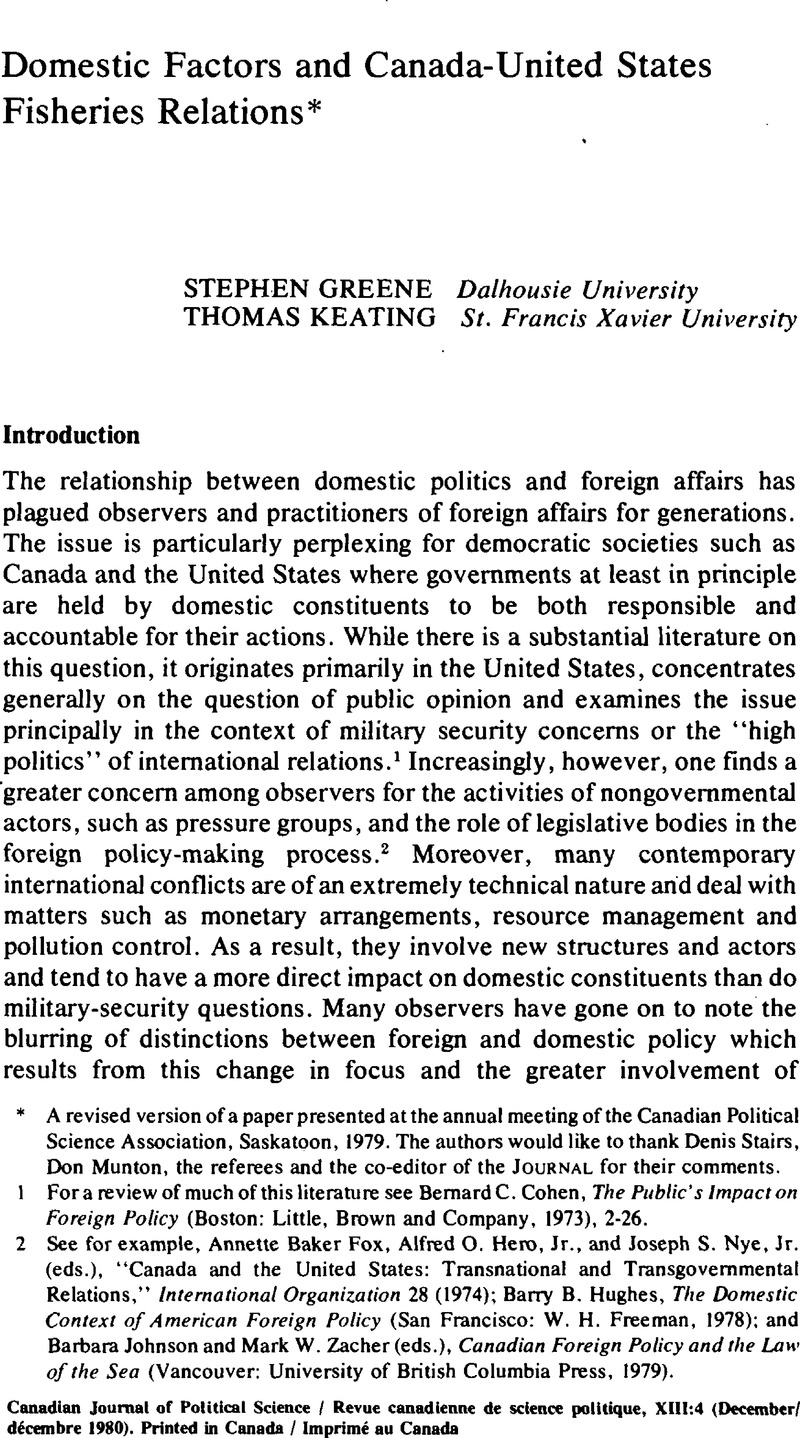No CrossRef data available.
Published online by Cambridge University Press: 10 November 2009

1 For a review of much of this literature see Cohen, Bernard C., The Public's Impact on Foreign Policy (Boston: Little, Brown and Company, 1973), 2–26Google Scholar.
2 See for example, Fox, Annette Baker, Hero, Alfred O. Jr., and Nye, Joseph S. Jr. (eds.), “Canada and the United States: Transnational and Transgovernmental Relations,” International Organization 28 (1974)Google Scholar; Hughes, Barry B., The Domestic Context of American Foreign Policy (San Francisco: W. H. Freeman, 1978)Google Scholar; and Johnson, Barbara and Zacher, Mark W. (eds.), Canadian Foreign Policy and the Law of the Sea (Vancouver: University of British Columbia Press, 1979)Google Scholar.
3 For a discussion of the effects of these developments on Canadian foreign policy-making see Stairs, Denis, “Public Opinion and External Affairs: Reflections on the Domestication of Canadian Foreign Policy,” International Journal 33 (1978), 143–49CrossRefGoogle Scholar.
4 For a discussion of the international implications of the Boldt decision see Schmidhauser, John R., “Whales and Salmon: The Interface of Pacific Ocean and Cross-National Policy Making,” in Walsh, Don (ed.), The Law of the Sea (New York: Praeger Special Studies, 1976), 144–71Google Scholar.
5 US Chief Negotiator Lloyd Cutler in testimony before the US Senate Committee on Foreign Relations, June 13, 1978.
6 New York Times, June 19, 1978.
7 Globe and Mail, May 9, 1978.
8 Vancouver Sun, May 6, 1978.
9 Globe and Mail, May 9, 1978.
10 The Swiftsure Bank issue received almost as much parliamentary attention as earlier agreements. The 1978 agreement and the negotiations leading up to its signing were subject to more parliamentary debate than bilateral fisheries relations had received in the previous seven years combined.
11 Senator Warren Magnuson during a hearing of the Senate Commerce Committee, May 26, 1978.
12 House of Commons Standing Committee on Fisheries and Forestry, Minutes and Proceedings, April 6, 1978.
13 Halifax, Chronicle Herald, April 28, 1978Google Scholar.
14 Ottawa, Citizen, May 27, 1978Google Scholar.
15 House of Commons, Debates, June 2, 1978Google Scholar.
16 Globe and Mail, June 5, 1978Google Scholar.
17 House of Commons Standing Committee on Fisheries and Forestry, Minutes, June 6, 1978Google Scholar.
18 Confidential Interview, Washington, D.C., June 1978.
19 Confidential Interview, Washington, D.C., June 1978.
20 House of Commons, Debates, June 8, 1978Google Scholar.
21 National Fisherman, August 1978Google Scholar.
22 Congressman Michael Harrington of Massachusetts suggested that “the damage of heavy Canadian fish imports to. the domestic fishing industry is particularly dramatic… at a time when U.S. fishermen were suddenly ejected from Canadian-controlled waters traditionally shared by both nations.” Congressional Record, July 14, 1978Google Scholar.
23 Confidential Interview, Washington, D.C., June 1978.
24 Confidential Interview, Washington, D.C., June 1978.
25 Confidential Interview, Washington, D.C. June 1978.
26 Much of the difficulty in the Newfoundland fishery during the summer of 1979 resulted from the removal of the two cent per pound subsidy paid to fishermen under GTAP.
27 Keohane, Robert O. and Nye, Joseph S. Jr., “Introduction: The Complex Politics of Canadian-American Interdependence,” International Organization 28 (1974), 603CrossRefGoogle Scholar.
28 Ibid., 603.
29 Canada, Department of Environment, Fisheries and Marine Service, “Policy for Canada's Commercial Fisheries” (1976), 5.
30 US Congress, Office of Technology Assessment, “Establishing a 200-Mile Fisheries Zone” (1976), 95.
31 Leyton-Brown, David, “The Multinational Enterprise and Conflict in Canadian-American Relations,” International Organization 28 (1974), 734CrossRefGoogle Scholar.
32 Nossal, Kim Richard, “The Unmaking of Garrison: United States Politics and the Management of Canadian-American Boundary Waters,” Behind the Headlines 37 (1978), 7Google Scholar.
33 Barry, Donald, “Interest Groups and the Foreign Policy Process: The Case of Biafra,” in Pross, A. Paul (ed.). Pressure Group Behaviour in Canadian Politics (Toronto: McGraw-Hill Ryerson, 1975), 136Google Scholar.
34 Alper, Donald K and Monahan, Roberts., “Bill C-58 and the American Congress: The Politics of Retaliation,” Canadian Public Policy 4 (1978), 191CrossRefGoogle Scholar.
35 Bennet, Douglas J. Jr., “Congress and Foreign Policy: Who Needs It,” Foreign Affairs 57 (1978), 43CrossRefGoogle Scholar.
36 Swanson, Roger Frank, Intergovernmental Perspectives on the Canada-U.S. Relationship (New York: New York University Press, 1978), 8Google Scholar.
37 One group which sharply criticized the advisory council structure was the British Columbia-based United Fishermen and Allied Workers Union. See House of Commons Standing Committee on Fisheries and Forestry, May 18, 1978.
38 Hollick, Ann L., “Canadian-American Relations: Law of the Sea,” International Organization 28 (1974), 773CrossRefGoogle Scholar.
39 Hollick, Ann L., “Seabeds Make Strange Politics,” Foreign Policy 9 (1972), 148CrossRefGoogle Scholar.
40 For a discussion of these and other tools available to decision-makers for simplifying these external pressures see Stairs, Denis, “Publics and Policy-Makers: The Domestic Environment of the Foreign Policy Community,” International Journal 26 (1970), 235–48CrossRefGoogle Scholar.
41 Meekison, Peter, “Provincial Activity Adds New Dimension to Federalism,” International Perspectives (March/April 1977), 8Google Scholar.
42 Levy, Thomas and Munton, Don, “Federal-Provincial Dimensions of State-Provincial Relations,” International Perspectives (March/April 1976), 27Google Scholar.
43 Swanson, Intergovernmental Perspectives on the Canada-U.S. Relationship, 13.
44 Morse, E. L., Modernization and the Transformation ofInternational Relations (New York: Free Press, 1976), 83–84Google Scholar.